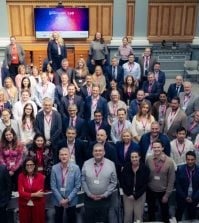Making innovation normal

At a major conference on innovation in government, delegates learned new ways to rebuild public trust, how civil servants are using behavioural economics – and why innovation is like bungie-jumping. James Johns reports
Paris is often referred to as the City of Light – recognising both its leading role during the age of enlightenment, and the fact that it was one of the first European cities to adopt gas street lighting. And such ambition and civic creativity is not solely to be found in the city’s past. Earlier this month, it beat 31 other cities to win a €1m (US$1.2m) prize as the European Union’s 2017 Capital of Innovation, recognising its success in applying novel solutions to drive urban redevelopment and economic growth. The city has seen the construction of more than 100,000m2 of incubator space during the last ten years, and is now home to the world’s largest start-up campus: Station F, located in a refurbished rail depot.
It seems fitting, then, that Paris should play host to a conference on the theme ‘Innovation in Government – the New Normal’. Organised jointly by the EU and the OECD’s Observatory of Public Sector Innovation (OPSI), the two-day event took place at the OECD’s spectacular Château de la Muette HQ on 20-21 November. Speakers from countries as far afield as Canada, New Zealand, South Africa and Finland shared their experiences of driving innovative reforms across a range of different public services, from healthcare to nuclear regulation.
Innovation, said one of the first speakers, is like bungie-jumping. “You first have to have a crazy guy who jumps,” commented Slovenian deputy prime minister Boris Koprivnikar. “Then the others, looking at it, say: ‘Well, it’s fine. It’s fun.’ And they start to jump. And at the end, you always have a few people that you have to tie on and push.”
Who’s jumping, who’s pushing?

“No-one wants to change in public administration”, Maria Leitao Marques, Portugal’s minister of administrative modernisation (Image courtesy: MarcoIlluminati/OECD).
The identity of those pushed over the edge, however, was a subject of debate. Several pointed the finger at public officials – with Portugal’s minister of administrative modernisation, Maria Leitao Marques, commenting baldly that “no-one wants to change in public administration”. But whilst many speakers cited the challenges of building capability and tackling the cultural change necessary to support innovation in government, no one listening to the rich set of case studies presented over the following two days could reasonably have thought it hard to find examples of real bravery and innovation among the world’s public servants.
Despite the wide range of developmental states to be found amongst the more than 65 countries represented at the event, it was the commonality of both problems and solutions being pursued which was most striking to observe. The need to find innovative responses to a loss of faith in government was a common theme. OECD secretary-general Angel Gurría told the audience that only 4 out of 10 citizens across his organisation’s 35 member states claimed to trust their government. Many speakers cited the familiar challenge of responding to citizens’ raised expectations – driven by the technological changes they see in commercial services – together with the ever-present obligation to do “more with less”. Solutions involving differing methods of putting the user at the heart of public services were mentioned by many of those who presented case studies – including a Parisian project, in which €100m of the city’s 2017 investment budget was made available to support projects created in response to citizen submissions.

Only 4 out of 10 citizens across his organisation’s 35 member states claimed to trust their government, says OECD secretary-general Angel Gurría
Entering the mainstream
It is clear that many of the innovations in government considered novel only a few years ago are now mainstream. In a session focussed on the use of behavioural economics, participants learned that there are now more than 130 countries with teams employing these techniques to ‘nudge’ citizens into making better choices in their interactions with public services.

“La bonne boite”, a pioneering website using an algorithm to predict which companies in a given region are likely to be recruiting new staff, introduced by Laure Lucchesi from France’s national open data team, Etalab (Image courtesy: MarcoIlluminati/OECD).
The range of policy challenges to which this technique is being applied is impressively broad, from dietary advice to raising participation in education. Margarita Gomez from Mexico’s National Laboratory for Public Policy, explained that her team was prioritising the application of Behavioural Insights to addressing corruption by public officials – a problem which, it’s estimated, consumes 14% of the average family’s expenditure in her country.
Digital transformation featured heavily, and it was pleasing to see that some of the most innovative solutions were presented by smaller countries such as New Zealand – which, having learned from the experiences of bigger nations, are now putting themselves at the leading edge. The conference also spent time considering how the next generation of digital technologies might find a role in government. ‘Distributed ledger’ technologies such as blockchain could, for example, play an important role in re-establishing trust in certain types of transaction. Artificial Intelligence was also a frequent topic of discussion. Laure Lucchesi from France’s national open data team, Etalab, introduced a pioneering website called “La bonne boite”: this uses an algorithm to predict which companies in a given region are likely to be recruiting new staff.
Keeping up with technology

Darja Isaksson, entrepreneur and member of the Swedish prime minister’s Innovation Council, believes a virtual appointment may be the primary way healthcare is accessed in Sweden within 2 years (Image courtesy: MarcoIlluminati/OECD).
Many of the speakers identified the sheer pace of change as one of their most significant challenges – particularly given that most legislatures remain unreformed, and lack the expertise or systems to address regulatory and service delivery challenges such as social media, autonomous vehicles and digital services. Speakers reflecting on this theme sounded the strongest note of caution during the event.
For example, Darja Isaksson – an entrepreneur and member of the Swedish prime minister’s Innovation Council – noted that online GP services are experiencing double-digit growth in Sweden, and within two years a virtual appointment may be the default access point for healthcare. But all value chains become global when digitised, she argued: how can a single government hope to regulate such a service?
Intergovernment collaboration – whether simply to share ideas or to tackle such cross-border issues – looks certain to play an increasingly important role in the work of public servants. Innovation in government might not quite yet be the new normal. But given the external influences most governments are increasingly having to face, no one can doubt that it’s going to have to be.
Much of the event was live-streamed and is available to view online via the OECD’s Video-on-Demand service.






















A strong economy founded on sound public finances should be at the heart of all political parties’ calculations. However, notwithstanding the efforts made by politicians to educate citizens about these issues, the fact remains that most voters are pretty ignorant about policy, politics and economics.
This lies at the root of all that has gone so badly wrong with our model of democracy, which is completely reliant on an informed public making choices in the field of politics, on the basis of established facts and what is commonly known to be true.
It would also explain why there is very little confidence in the ability of big government to fix market failures or use the instrument of regulation to curb anti-competitive behaviour.
But it is not only voters who are ill-informed about current affairs – this failing extends to people who are in the pay of the State too. After all, they are drawn from the same array of ordinary citizens to perform the functions of government (and regulators), which means that there is nothing special about their skills, qualities or capabilities.
Indeed, their reputation is diminished further by the fact that their ability to innovate, solve problems, learn from past mistakes and adapt to change, which is a distinctive characteristic of people in the Private Sector, has been erased in the Public Sector due to incessant conditioning of the mind from an early age.
However, what is especially worrying about people in the pay of the State is that they haven’t got a clue about what it is that drives the behaviour of for-profit organisations in the free market – not least, because they have not spent a single day of their lives in the Private Sector – and yet they have been put in charge of spending taxpayers’ money to buy goods, services and labour from non-public sector organisations.
Worse still, in specialised markets such as that in military equipment for the Armed Forces, the role of the regulatory authority and sponsoring agency has been combined in one department of state – the Ministry of Defence in the UK – which means that the independent scrutiny function, free from political interference, is non-existent.
So, successful capture of a department of state by the Defence Industry amounts to taking control over both roles!
Which would probably explain why the Defence Industry has failed so miserably to deliver equipment to the Armed Forces which is fit for purpose, adequately sustained in-service and constitutes value for money through-life, for as long as anyone can remember.
Instead of doing the decent thing and educating people in the pay of the State about the ways of the Private Sector, defence contractors are busy exploiting their ignorance, for one purpose only – relieving them of taxpayers’ money – which has, in itself, left the public finances in pretty bad shape.
It’s not so much a lack of skills in the Public Sector that is the problem, but a surplus of people with the wrong skills. Some people say that they can be retrained to equip them with the necessary skills which will enable them to deal with today’s challenging public service tasks. But the undeniable truth is that these people are simply beyond repair!
@JagPatel3